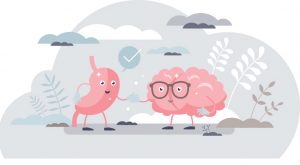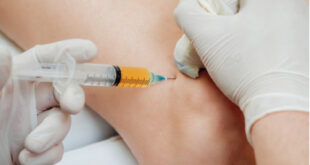By Renee Chillcott, LMHC
 Every one of us has made a reference to our gut having a brain connection. Sayings such as “I trust my gut”, “a feeling in the pit of my stomach” or even “butterflies in my stomach” are validation that sometimes we have feelings in our gut and our brain. This phenomenon is helping medicine understand the link between digestion, mood, health, and the way we think.
Every one of us has made a reference to our gut having a brain connection. Sayings such as “I trust my gut”, “a feeling in the pit of my stomach” or even “butterflies in my stomach” are validation that sometimes we have feelings in our gut and our brain. This phenomenon is helping medicine understand the link between digestion, mood, health, and the way we think.
According to John’s Hopkins Medicine when we speak of the gut brain connection, we are really talking about digestion. Scientists call this the enteric nervous system (ENS). The ENS is two thin layers of more than 100 million nerve cells lining your gastrointestinal tract from esophagus to rectum. Its main role is controlling digestion, from swallowing to the release of enzymes that break down food to the control of blood flow that helps with nutrient absorption to elimination. The enteric nervous system doesn’t seem capable of thinking as we know it, but it communicates back and forth with our big brain, with profound results.
The ENS may trigger big emotional shifts experienced by people coping with irritable bowel syndrome (IBS) and functional bowel problems such as constipation, diarrhea, bloating, pain and stomach upset. For decades, researchers and doctors thought that anxiety and depression contributed to these problems. But our studies and others show that it may also be the other way around. Researchers are finding evidence that irritation in the gastrointestinal system may send signals to the central nervous system (CNS) that trigger mood changes.
These new findings may explain why a higher-than-normal percentage of people with IBS and functional bowel problems develop depression and anxiety. That’s important data, because up to 30% to 40% of the population has functional bowel problems at some point.
WHAT DOES THIS MEAN FOR ME?
When we’re speaking of digestion, we are really talking about food and nutrition. So, the saying “You are what you eat” now connects nutrition with mental health or emotions. It is also important to know that as no 2 brains are the same, no 2 digestive systems are the same either. Every person that walks through our doors has a unique gut and brain presentation and it is our job to evaluate and get to know both.
Today’s therapist must incorporate nutrition, digestion, and absorption into the equation of effective mental health. Neurofeedback treatment with the Brain and Wellness Center strives to do this. We work well with your current providers and want to help coordinate care to provide a more Holistic treatment that emphasizes the brain and gut relationship.
NEUROFEEDBACK CAN HELP
Neurofeedback can not only help reduce the symptoms specific to you, but it can “retrain” the neural patterns in the brain so that stress is better managed or controlled throughout your life. Through Neuroplasticity, Neurofeedback becomes a permanent correction of the dysregulated patterns in the brain. When neuron firing in the brain is healthy; the signals sent to the gut are also healthy. This is the first step in improving the relationship between digestion and mood.
WHAT IS NEUROFEEDBACK?
Neurofeedback, also known as EEG biofeedback, has been studied and practiced since the late 60’s. It is exercise for your brain; allowing you to see the frequencies produced by different parts of your brain in real-time and then through visual and auditory feedback, teaches the brain to better regulate itself. Neurofeedback can be used to help detect, stimulate, and/or inhibit activity in the brain safely and without medication. It can help restore a wider “range of motion” in brain states, much like physical therapy does for the body.
While the client sits comfortably watching a movie or pictures appear on the screen (a calm and focused state), the EEG equipment measures the frequency or speed at which electrical activity moves in the areas where electrodes have been placed. This information is sent to the therapist’s computer. The therapist is then able to determine what frequencies are out of balance. For example, when the EEG shows that you are making too many “slow” or “sleepy” waves (delta/theta) or too many “fast” waves (high beta), the therapist adjusts a reward band to encourage more balanced activity. This encouragement or “reward” happens through an auditory reinforcement of “beeps” and sometimes through visual reinforcement of changes on the screen.
WHAT TYPES OF CONDITIONS DOES NEUROFEEDBACK HELP?
Symptoms of these conditions, among others, can improve through neurofeedback training:
Anxiety
Sleep disorders
Depression
ADD/ADHD
Sensory processing disorder
Bipolar disorder
Seizure disorders
Auditory/visual processing
Chronic pain/Fibromyalgia
Migraines/headaches
Traumatic brain injuries
Stroke
Cognitive decline
Peak performance
Oppositional defiant disorder
Rages/mood swings
Attention/focus/concentration
Reactive attachment disorder
Autism/Asperger’s
Learning disabilities
Obsessive compulsive disorder
HOW DOES A “BEEP” OR SOUND TRAIN MY BRAIN TO WORK BETTER?
The auditory or sound reward that corresponds to an increase or decrease in desired brainwave activity can affect the brain on a neurological level. Auditory reward stimulates auditory pathways, impacts the vestibular system, and has many connections to the reticular activating system, which modulates wakefulness and attention. These systems operate in our brains without conscious effort. Therefore, neurofeedback teaches your brain through automated learning with little or no behavioral effort. Another way to say this is that neurofeedback involves operant conditioning or learning. This type of learning teaches us through a reinforced reward system. The auditory reward (beep) is delivered on a schedule of reinforcement that promotes optimal learning; not too hard and not too easy. This schedule of reinforcement or reward provides just the right amount of resistance to evoke a positive learning pattern.
WHAT IS A QEEG (QUANTITATIVE EEG) OR BRAIN MAP?
The QEEG is a quantitative EEG. It’s also called a brain map and does just that…it gives us a map of what is going on with the entire brain at one time. We attach electrodes to the whole head, 19 spots, and then record the brain waves with eyes open for 5 minutes and with eyes closed for 10 minutes. This recording is then read and analyzed. The brain activity is not only compared spot by spot over the entire head, but we can also look at connections, symmetry, how different parts are communicating, and this data is compared to a database of peers (same sex, handedness, and age). It can help us see what areas need to be addressed more efficiently than just training spot by spot.
We don’t always need this data to make improvements in symptoms, but we do recommend it in certain situations. A QEEG can also be helpful information when diagnosing and/or trying to decide the best medication/supplement recommendations.
HOW DOES THE BRAIN AND WELLNESS CENTER ADDRESS MY GUT?
At the center we have partnered with Trace Elements and Immunolabs to provide Hair analysis and Sensitivity Testing, respectively.
Hair Analysis: Because your hair is cellular, we are able to look at all of the minerals that have been stored in your cells including nutritional minerals as well as toxic heavy metals. With this information your metabolic picture is formed. Not only can your nutritional status be viewed, but we can also learn much about how efficiently your body is working. Results also include information on how to achieve a better balance of minerals an how to improve absorption through increasing and decreasing certain foods. Therefore, diet recommendations are included.
Sensitivity Testing: There are a variety of sensitivity tests that are available. Different types of foods and different numbers of foods as well as tests specifically for Celiac, Yeast, Outdoor/environmental sensitivities, and common household sensitivities. Some testing is prescribed to a lab, and some can be performed in the office. Sensitivity Tests look for antibodies in the blood that indicate your body is fighting off certain foods or irritants. Like the Hair Analysis, a diet avoiding sensitive foods is provided. In some cases, if a client receives both tests, we can combine the results for an even more comprehensive diet.
With the Neurofeedback sessions, we can provide nutritional counseling and make supplement suggestions based on neuron firing findings and individual characteristics.
HOW MANY SESSIONS ARE NEEDED TO BEGIN SEEING RESULTS?
As the brain learns, you will see the changes. However, everyone learns at different speeds, so it cannot be determined how quickly someone will learn. On average, children take about 10-20 sessions to see changes and we can discuss what to expect during the intake appointment. For adults changes are usually noticed within 10 sessions. Total treatment is an average of 40 sessions; however, we individualize all aspects of treatment and find that some people need more and some less.
HOW DO I GET STARTED?
Getting started is easy. The Brain and Wellness Center staff will answer all of your questions, and help you get scheduled with a free telephone consultation. Call, email or text message us today at our NEW ADDRESS: Brain and Wellness Center, 5458 Town Center Road, MedPlex Building, Suite 13, Boca Raton, FL 33486. (561) 206-2706, e-mail us at info@bocabraincenter.com, or text us at (561) 206-2706 or visit our website at www.BocaBrainCenter.com.
Renee Chillcott, LMHC
Renee Chillcott is a Licensed Mental Health Counselor that has been practicing Neurofeedback training since 2005. Renee holds a BA degree from The University of Central Florida and a Master’s Degree in Psychology/Mental Health Counseling from Nova Southeastern University. She is a Licensed Mental Health Counselor and is the owner/operator of The Brain and Wellness Center, located in Boca Raton. At the Brain and Wellness Center, adults, teens, children and families enjoy a variety of services from multiple providers. Neurofeedback, Brain Mapping, SSP, EMDR, Learning Programs, and counseling are among a few of the services offered.
5458 Town Center Road, Suite 13
Boca Raton, FL 33486
(561) 206-2706
www.BocaBrainCenter.com
 South Florida Health and Wellness Magazine Health and Wellness Articles
South Florida Health and Wellness Magazine Health and Wellness Articles




